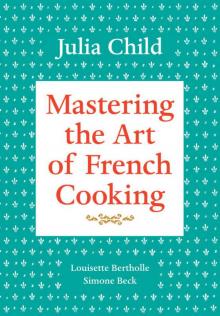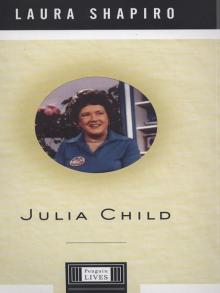- Home
- Julia Child
Mastering the Art of French Cooking, Volume 1 Page 35
Mastering the Art of French Cooking, Volume 1 Read online
Page 35
Choose a piece of beef of at least 3 pounds, and, however long it is, its width should be at least 4 inches. It shrinks quite a bit during cooking. Count on 1 pound of boneless beef for 2 or 3 people.
First Choice: Rump Pot Roast—Pointe de Culotte, or Aiguillette de Rumsteck
Other Choices: Sirloin Tip, Knuckle—Tranche Grasse
Chuck Pot Roast—Paleron or Macreuse à Pot-au-feu
Top Round—Tende de Tranche
Bottom Round—Gîte à la Noix
Eye of Round—Rond de Gîte à la Noix
For 10 to 12 people
Red wine marinade
An enameled, pyrex, or porcelain bowl just large enough to hold all the ingredients listed
1 cup each: thinly sliced carrots, onions, and celery stalks
2 halved cloves unpeeled garlic
1 Tb thyme
2 bay leaves
¼ cup minced parsley
2 whole cloves or 4 allspice berries
A 5-lb. piece of braising beef trimmed and tied for cooking
1 Tb salt
¼ tsp pepper
5 cups young red wine with body—Burgundy, Côtes du Rhône, Mâcon, or Chianti
⅓ cup brandy
½ cup olive oil
Place half the vegetables, herbs, and spices in the bottom of the bowl. Rub the meat with salt and pepper and place it over the vegetables. Spread the rest of the vegetables and herbs over the meat. Pour on the wine, brandy, and olive oil. Cover and marinate for at least 6 hours (12 to 24 hours if the meat is refrigerated). Turn and baste the meat every hour or so.
Half an hour before cooking, drain the meat on a rack. Just before browning, dry it thoroughly with paper towels. It will not brown if it is damp.
Browning and braising the beef
Preheat oven to 350 degrees.
A fireproof casserole or heavy roaster just large enough to hold the meat and braising ingredients
4 to 6 Tb rendered pork fat or cooking oil
Add the fat to the casserole and place over moderately high heat. When fat is on the point of smoking, brown the meat on all sides. This takes about 15 minutes. Pour out the browning fat.
(*) Recipe may be prepared in advance up to this point.
One or all of these to give body to the sauce:
1 or 2 cracked veal knuckles
1 or 2 split calf’s feet
4 to 8 ounces fresh pork rind, bacon rind, or ham rind simmered 10 minutes in a quart of water, rinsed, and drained
4 to 6 cups beef stock, or canned beef bouillon
Pour in the wine marinade and boil it down rapidly until it has reduced by half. Then add the veal knuckles, calf’s feet, and rind, and pour in enough stock or bouillon to come two thirds of the way up the beef. Bring to a simmer on top of the stove, skim, cover tightly, and set in lower third of preheated oven. Regulate heat so liquid remains at a gentle simmer for 2½ to 3 hours, and turn the meat several times during its braising. The beef is done when a sharp-pronged fork will pierce it easily.
2 lbs. quartered carrots braised in butter
24 to 36 small white onions, brown-braised in stock
While the beef is being braised, cook the carrots and onions. Set them aside until needed.
A hot serving platter
When the meat is tender, remove it to the platter. Discard trussing strings. Trim off any loose fat, and keep the meat warm while finishing the sauce (5 to 10 minutes).
1 Tb arrowroot or cornstarch mixed with 2 Tb Madeira or port, if needed
Skim the fat off the braising juices, and strain them through a sieve into a saucepan, pressing the liquid out of the vegetables. Simmer for a minute or two, skimming, then boil rapidly until liquid is reduced to about 3½ cups and is full of flavor. Taste carefully for seasoning. Sauce should be lightly thickened. If too thin, beat in the starch and wine mixture and simmer for 3 minutes. Then add the cooked carrots and onions and simmer for 2 minutes to blend flavors.
A slotted spoon
Parsley sprigs
A warmed sauceboat
Remove vegetables with a slotted spoon and arrange them around the meat. Decorate with parsley. Pour a bit of sauce over the meat and send the rest to the table in a warmed sauceboat. (Or carve the meat and arrange on the platter with the vegetables and parsley, and spoon some of the sauce over the meat.)
(*) AHEAD-OF-TIME NOTES
For a wait of up to one hour, return meat, vegetables and sauce to casserole, cover loosely, and set over barely simmering water.
For a longer wait, slice the meat and arrange it on a fireproof platter. Place the vegetables around the meat. Baste with the sauce. Half an hour before serving, cover and reheat in a 350-degree oven. Leftover braised beef will be just as good the next day, heated up the same way.
VARIATIONS
Cold Braised Beef
This recipe for beef braised in red wine may easily be turned into an aspic by following the directions for boeuf à la mode en gelée. Cold braised beef may also be served as a salad, by following the directions for salade de boeuf à la parisienne.
Pièce de Boeuf à la Cuillère
[Minced Braised Beef Served in a Beef Shell]
From la vieille cuisine française comes an unusual way to serve braised beef for a dinner party. First the beef is braised; then meat is cut out from its top and center to leave a shell of beef which is crumbed and browned in the oven. The removed beef is chopped, combined with sautéed mushrooms, minced ham, and sauce, and is returned to the shell for serving. A nice thing about this recipe is that all may be readied in advance for a 5- to 10-minute heating just before serving.
For 10 to 12 people
Braising the beef
Braise the beef and make the sauce following the master recipe, but simmer the meat only until it is almost tender, about 3 hours for a 5-pound piece. It should still be firm enough to hold its shape when the shell is made. Choose a solid, lean piece of top round with no muscle separations. It should weigh at least 5 pounds and be cut into an even rectangular block about 5 inches wide and 5 inches deep.
Making the shell
When the meat is done, remove it from the sauce. Place it under a board and a 2-pound weight to preserve its shape for about an hour while it cools to tepid. Then trim it, if necessary, into a neat rectangle. Hollow out the center, leaving an open-topped rectangular trough or shell of meat with sides and bottom half an inch thick. Chop the removed meat, including any trimmed-off bits, into ⅛-inch pieces. Place them in a large, heavy-bottomed, enameled saucepan, skillet, or casserole.
Preparing the filling
½ lb. fresh mushrooms, quartered and sautéed in oil and butter with 1 Tb minced shallots or green onions
¾ cup (4 ounces) lean, minced, boiled ham
1½ cups sauce from the braised beef
Stir the mushrooms and ham into the chopped beef, and blend in the sauce. Simmer slowly, covered, for 15 to 20 minutes, stirring frequently. Add a little more sauce if the mixture becomes too thick. It should hold its shape fairly solidly in a spoon. Carefully correct seasoning. Film top of mixture with a spoonful of stock or a bit of melted butter and set aside, uncovered, or refrigerate, until needed.
Finishing the shell
A pastry brush
2 eggs beaten in a small bowl with 1 tsp water and a pinch of salt
2 cups fine, dry, white bread crumbs tossed with ½ cup grated Parmesan cheese
½ cup melted butter
A rack set on a roasting pan
Using a pastry brush, paint the whole beef shell with beaten egg. Pat on a layer of cheese and bread crumbs. Sprinkle with butter and set the shell on the rack. Refrigerate until needed.
(*) Recipe may be completed even a day ahead up to this point.
Final assembly
Preheat oven to 450 degrees.
A vegetable garnish such as braised onions and carrots, and sautéed potatoes, OR baked tomatoes, and green beans or braised lettuce
The rest of
the sauce from the braised beef poured into a gravy bowl
A hot serving platter
¼ cup minced parsley
About 5 to 10 minutes before serving, set the beef shell in the oven to brown the crumb and cheese covering lightly. Reheat the filling to the simmer. Heat the vegetable garniture and the sauce. Then place the browned shell on the platter, heap with meat mixture, and sprinkle parsley over it. Arrange the vegetables about the platter. Pass the sauce separately. Each guest cuts down the crusty, tender shell with a serving spoon to help himself to part of it and its filling.
BEEF STEWS
Ragoûts de Boeuf
Of the several types of beef stew in which the meat is browned, then simmered in an aromatic liquid, boeuf bourguignon is the most famous. The daubes, estouffades, and terrines usually require no browning, and are much simpler to do. To be technically correct, any recipe describing meat which is browned before it is simmered should be labeled a fricassee; we shall not always make the distinction here because stew has become current usage.
CUTS FOR STEWING
The better the meat, the better the stew. While cheaper and coarser cuts may be used, the following are most recommended. Count on 1 pound of boneless meat, trimmed of fat, for 2 people; 3 if the rest of the menu is large.
First Choice: Rump Pot Roast—Pointe de Culotte, or Aiguillette de Rumsteck
Other Choices: Chuck Pot Roast—Paleron, or Macreuse à Pot-au-feu
Sirloin Tip—Tranche Grasse
Top Round—Tende de Tranche
Bottom Round—Gîte à la Noix
COOKING TIME
Beef stews take 2 to 3 hours of simmering depending on the quality and tenderness of the meat. If it has been marinated before cooking, it may take less time. Stews may be cooked either in the oven or on top of the stove; the oven is preferable because its heat is more uniform.
BOEUF BOURGUIGNON
BOEUF À LA BOURGUIGNONNE
[Beef Stew in Red Wine, with Bacon, Onions, and Mushrooms]
As is the case with most famous dishes, there are more ways than one to arrive at a good boeuf bourguignon. Carefully done, and perfectly flavored, it is certainly one of the most delicious beef dishes concocted by man, and can well be the main course for a buffet dinner. Fortunately you can prepare it completely ahead, even a day in advance, and it only gains in flavor when reheated.
VEGETABLE AND WINE SUGGESTIONS
Boiled potatoes are traditionally served with this dish. Buttered noodles or steamed rice may be substituted. If you also wish a green vegetable, buttered peas would be your best choice. Serve with the beef a fairly full-bodied, young red wine, such as Beaujolais, Côtes du Rhône, Bordeaux-St. Émilion, or Burgundy.
For 6 people
A 6-ounce chunk of bacon
Remove rind, and cut bacon into lardons (sticks, ¼ inch thick and 1½ inches long). Simmer rind and bacon for 10 minutes in 1½ quarts of water. Drain and dry.
Preheat oven to 450 degrees.
A 9- to 10-inch fireproof casserole 3 inches deep
1 Tb olive oil or cooking oil
A slotted spoon
Sauté the bacon in the oil over moderate heat for 2 to 3 minutes to brown lightly. Remove to a side dish with a slotted spoon. Set casserole aside. Reheat until fat is almost smoking before you sauté the beef.
3 lbs. lean stewing beef cut into 2-inch cubes (see preceding list of cuts)
Dry the beef in paper towels; it will not brown if it is damp. Sauté it, a few pieces at a time, in the hot oil and bacon fat until nicely browned on all sides. Add it to the bacon.
1 sliced carrot
1 sliced onion
In the same fat, brown the sliced vegetables. Pour out the sautéing fat.
1 tsp salt
¼ tsp pepper
2 Tb flour
Return the beef and bacon to the casserole and toss with the salt and pepper. Then sprinkle on the flour and toss again to coat the beef lightly with the flour. Set casserole uncovered in middle position of preheated oven for 4 minutes. Toss the meat and return to oven for 4 minutes more. (This browns the flour and covers the meat with a light crust.) Remove casserole, and turn oven down to 325 degrees.
3 cups of a full-bodied, young red wine such as one of those suggested for serving, or a Chianti
2 to 3 cups brown beef stock or canned beef bouillon
1 Tb tomato paste
2 cloves mashed garlic
½ tsp thyme
A crumbled bay leaf
The blanched bacon rind
Stir in the wine, and enough stock or bouillon so that the meat is barely covered. Add the tomato paste, garlic, herbs, and bacon rind. Bring to simmer on top of the stove. Then cover the casserole and set in lower third of preheated oven. Regulate heat so liquid simmers very slowly for 2½ to 3 hours. The meat is done when a fork pierces it easily.
18 to 24 small white onions, brown-braised in stock
1 lb. quartered fresh mushrooms sautéed in butter
While the beef is cooking, prepare the onions and mushrooms. Set them aside until needed.
When the meat is tender, pour the contents of the casserole into a sieve set over a saucepan. Wash out the casserole and return the beef and bacon to it. Distribute the cooked onions and mushrooms over the meat.
Skim fat off the sauce. Simmer sauce for a minute or two, skimming off additional fat as it rises. You should have about 2½ cups of sauce thick enough to coat a spoon lightly. If too thin, boil it down rapidly. If too thick, mix in a few tablespoons of stock or canned bouillon. Taste carefully for seasoning. Pour the sauce over the meat and vegetables.
(*) Recipe may be completed in advance to this point.
Parsley sprigs
FOR IMMEDIATE SERVING: Cover the casserole and simmer for 2 to 3 minutes, basting the meat and vegetables with the sauce several times. Serve in its casserole, or arrange the stew on a platter surrounded with potatoes, noodles, or rice, and decorated with parsley.
FOR LATER SERVING: When cold, cover and refrigerate. About 15 to 20 minutes before serving, bring to the simmer, cover, and simmer very slowly for 10 minutes, occasionally basting the meat and vegetables with the sauce.
CARBONNADES À LA FLAMANDE
[Beef and Onions Braised in Beer]
Beer is typical for the Belgian braise, and gives a quite different character to beef than the red wine of the bourguignon. A bit of brown sugar masks the beer’s slightly bitter quality, and a little vinegar at the end gives character. Serve this with parsley potatoes or buttered noodles, a green salad, and beer.
For 6 people
A 3-lb. piece of lean beef from the chuck roast or rump
2 to 3 Tb rendered fresh pork fat or good cooking oil
A heavy skillet
Preheat oven to 325 degrees. Cut the beef into slices about 2 by 4 inches across and ½ inch thick. Dry on paper towels. Put a 1/16-inch layer of fat or oil in the skillet and heat until almost smoking. Brown the beef slices quickly, a few at a time, and set them aside.
1½ lbs. or 6 cups of sliced onions
Salt and pepper
4 cloves mashed garlic
Reduce heat to moderate. Stir the onions into the fat in the skillet, adding more fat if necessary, and brown the onions lightly for about 10 minutes, stirring frequently. Remove from heat, season with salt and pepper, and stir in the garlic.
A 9- to 10-inch fireproof casserole about 3½ inches deep
Salt and pepper
Arrange half the browned beef in the casserole and season lightly with salt and pepper. Spread half the onions over the beef. Repeat with the rest of the beef and onions.
1 cup strong beef stock or canned beef bouillon
2 to 3 cups light beer, Pilsner type
2 Tb light brown sugar
1 large herb bouquet: 6 parsley sprigs, 1 bay leaf, and ½ tsp thyme tied in cheesecloth
Heat the stock or bouillon in the browning skillet, scraping up coagulated cooking juices. Pour it over the mea
t. Add enough beer so the meat is barely covered. Stir in the brown sugar. Bury the herb bouquet among the meat slices. Bring casserole to the simmer on top of the stove. Then cover the casserole and place in lower third of preheated oven. Regulate heat so liquid remains at a very slow simmer for 2½ hours at the end of which time the meat should be fork-tender.
1½ Tb arrowroot or cornstarch blended with 2 Tb wine vinegar
Remove herb bouquet. Drain the cooking liquid out of the casserole into a saucepan, and skim off fat. Beat the starch and wine vinegar mixture into the cooking liquid and simmer for 3 to 4 minutes. Carefully correct seasoning. You should have about 2 cups of sauce. Pour the sauce back over the meat.
(*) May be prepared in advance to this point.
Parsley potatoes or buttered noodles
Parsley sprigs
When ready to serve, cover the casserole and simmer slowly for 4 to 5 minutes until the meat is thoroughly heated through. Either bring the casserole to the table, or arrange the meat on a hot serving platter, spoon the sauce over it, surround with potatoes or noodles, and decorate with parsley.
PAUPIETTES DE BOEUF
ROULADES DE BOEUF
PETITES BALLOTINES DE BOEUF
[Braised Stuffed Beef Rolls]

 Julia's Kitchen Wisdom
Julia's Kitchen Wisdom My Life in France
My Life in France Mastering the Art of French Cooking, Volume 1
Mastering the Art of French Cooking, Volume 1 Mastering the Art of French Cooking, Volume 2
Mastering the Art of French Cooking, Volume 2 Laura Shapiro
Laura Shapiro